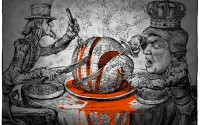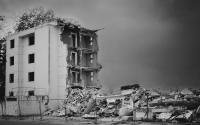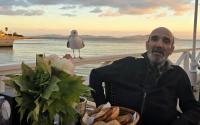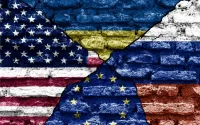20 November, 2003Another terrible terrorist atrocity, another steely vow to crush the terrorists. How long can this go on? George Bush and Tony Blair were united yesterday in their determina tion "to defeat this evil". The prime minister was adamant that "there must be no holding back, no compromise, no hesitation in confronting this menace, in attacking it wherever and whenever we can and in defeating it utterly". The president claimed, again, that the struggle against al-Qaida and its allies is being won. But the evidence suggests otherwise. The blood and rubble in the streets of Istanbul, for the second time in a week, tells a different story. The terroris ts showed once more that their ability and will to strike is undiminished, and may well be increasing. There appears no shortage of recruits; there is certainly no shortage of "soft" targets. As in Istanbul last Saturday, as in Bali, Djerba, Mombasa, Ja karta, Karachi, Riyadh and again in Iraq yesterday, this does not look like an enemy in post-9/11 retreat. This does not look like a war that is being won. It looks like a conflict that is in serious danger of escalating out of control. Yesterday's prom ises of unflinching retribution may be thought understandable. Yet it cannot merely come down to a matter of killing "them" before they kill "us". That is not a policy; that is capitulation to violence. Mr Bush and Mr Blair must consider some far deeper questions, beyond the primary issues of security. Who is this enemy that seems both invisible and ubiquitous? What causes this pitiless hatred? To say simply that they "hate freedom" is no explanation. Do Mr Bush and Mr Blair really bel ieve this is a war that can definitively be won? And are their policies in the Middle East and beyond steadily making matters worse, not better? Over two years after the Twin Towers, al-Qaida's three-pronged stratagem is not difficult to penetra te, even if its terror cells are. Its actions and those of its affiliates, taken as a whole, are intended to frighten and enrage, to polarise and to divide. Al-Qaida seeks to transform moderates into hardliners, to turn Muslim against Christian and Jew, to build confrontation between Islam and the west. By choosing confrontation too, by failing to communicate effectively with mainstream Muslim opinion, and crucially, by failing to draw the insidious poison of the Arab-Israeli conflict, western leaders have played into the terrorists' hands. Al-Qaida's business is rebellion. By its actions and inaction, the west has too frequently given these rebels a cause. Al-Qaida's stratagem is sustained, secondly, by one principal tool - horrific, random violence. Yet by meeting violence with an even greater violence of their own, the US and its allies have sometimes appeared to descend, in Afghanistan and now in Iraq, to that same brutish level. In all truth there is simply no comparis on between the war-time actions of, say, the British army round Basra and Turkish suicide bombers. But it is also true, sadly, that for many in the Muslim world, the resort to organised violence by the west effectively legitimises a reciprocal violence by whatever means possible. The use of force in Iraq, now enshrined as a governing principle by Mr Bush, invited a highly aggressive response. That response is in progress. The whirlwind is being reaped. The third leg of al-Qaida's strategy rests on the hope that the west, unable to defend itself and wearying of the fight, will somehow give up or give in or go away. This cannot happen. Mr Bush and Mr Blair have made many mistakes since 9/11. There is an urgent need for a radical review of policy. But in the teeth of such terror, there must also be solidarity. Yesterday was Britain's day to mourn, to grieve for our diplomats, our citizens and those many others so cruelly victimised in Istanbul - and grieve we do. But tomorrow, o r next week, or next month, if this goes on unchecked, it will be somebody else's awful turn. A candid admission of western failings does not imply submission to barbarity. There is no case for surrender. But there is a very strong case for a more intel ligent, less confrontational, combined east-west approach to an intensifying global crisis.
Kâinatın tüm seslerine, renklerine, titreşimlerine Açık Radyo...
Ekolojiden siyasete, edebiyattan müziğe Apaçık Radyo'da haftanın öne çıkan gündemleri mail kutunuzda!
İletişim
Açık Medya Yayıncılık A.Ş.
Koltukçular Çıkmazı No 7 İç Kapı No 2
Tophane, Beyoğlu, İstanbul, TR-34425
Telefon: +90 212 343 4040
Faks: +90 212 232 3219
E-posta: [email protected]






